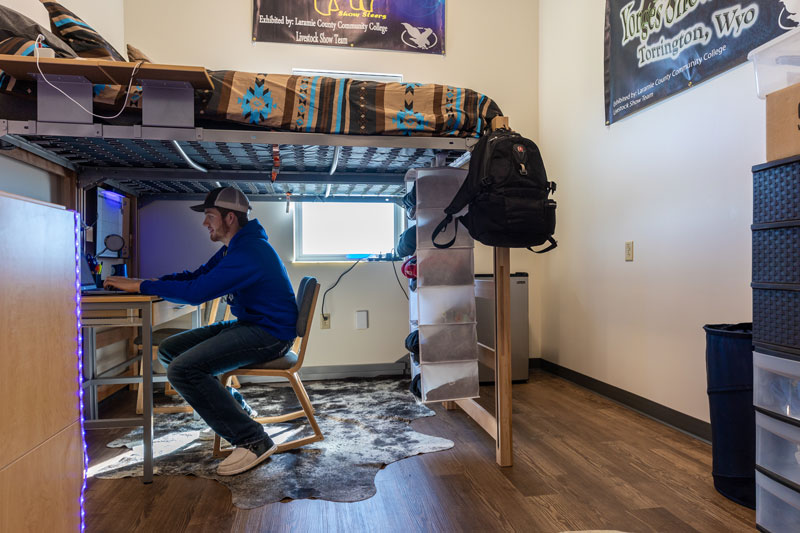College FAQ
 Can I afford the cost of college?
Can I afford the cost of college?
At LCCC, we think the answer is yes.
College is indeed an investment and any worthwhile venture involves risk. While many people know there are economic and quality of life benefits that can come with jobs requiring college degrees, many students are concerned they cannot afford to start college or will leave with insurmountable debt. In a recent survey, 72% of respondents in the Laramie County area and 78% of the rest of Wyoming thought they could not afford the cost of college. However, receiving a higher education or job training at LCCC is more affordable than you might think.
Starting at community college such as LCCC offers significant financial benefits, with financial aid and scholarships often covering a meaningful portion of tuition and fees for many students. Wyoming students may qualify for the Hathaway Scholarship, the Wyoming Works Grant or, beginning in 2025, Wyoming’s Tomorrow for nontraditional students (a measure known as Kickstart Wyoming’s Tomorrow can assist with those costs today). LCCC also offers recruitment scholarships and over 400 donor scholarships through its foundation, with an application period from Jan. 1 to April 1. Additionally, the lower cost of community college, compared to four-year institutions, can lead to substantial savings and less debt for graduates.
By saving money attending a community college, seeking scholarships and managing your finances responsibly, you can enter the workforce without insurmountable debt. Once you’re there, you’ll find your earnings — and having other benefits and perks associated with your job or jobs — will increase your quality of life significantly.
The earnings gap between college graduates and their counterparts without postsecondary degrees is growing. The Bureau of Labor Statistics showed that full-time workers ages 22-27 whose highest degree was a bachelor’s degree made $22,000 more in annual media wages compared to workers of the same age with no degree in 2021. By contrast, in 1990, that difference was only about $13,000 between bachelor’s degree holders and non-degree holders.
Can I be successful as a first-generation college student?
Yes, we believe you can. Going to college will have its challenges, no matter who you are or where you came from. But many are attempting to be the first in their families to earn a postsecondary credential, which can come with its own set of hurdles to clear.
Definitions of a first-generation college student vary, but it’s commonly understood as students whose parents did not complete a four-year degree. It’s difficult to pin down an exact number of how many U.S. students fall into that category, but it’s estimated one-third of all undergraduate students are first-generation students.
Pursuing a college degree as the first in your family not only sets you on a path to improve your life but also significantly boosts your earnings, job security, and access to benefits compared to just having a high school diploma.
If you're a first-generation college student concerned about the challenges ahead, rest assured that there is ample support available. Many community colleges offer specialized programs that provide academic assistance, mentorship, networking opportunities, and additional resources to help you succeed. These institutions also offer counseling, advising, financial aid, scholarships, and peer support groups tailored for first-generation students.
At Laramie County Community College in Cheyenne, the Davis First Generation Experience (DFGE) program specifically helps new students adjust to college life and tackle its challenges. Eligible students can receive benefits, including a free Strategies for Success Course, a $1,000 scholarship, early move-in, continued support from experienced faculty and staff and more.
If you can see yourself as a first-generation college student at LCCC, go to lccc.wy.edu/admissions/FirstGeneration.
Should I live on campus when I go to college?
We at LCCC think there are a lot of advantages to living on campus when you go to college.
Campus living is a defining part of the college experience for many students. The advantages of on-campus living are manifold. Proximity to academic resources like libraries and study spaces, as well as recreational facilities, not only saves time and money but also enriches the college experience by putting you in the center of the action on campus. Moreover, it fosters a sense of community, aiding students in making lasting friendships and feeling a sense of belonging, crucial during the transition from high school to college.
Melissa Nelson, Residential Living director at LCCC, emphasizes the academic and professional benefits of this close-knit community. On-campus residents often engage more deeply in campus life through clubs, events, and leadership roles, gaining valuable skills and experiences.
Studies affirm the benefits of residential living, with research from the Higher Education Research Institute finding that on-campus students are more likely to graduate. LCCC caters to about 330 residents with varied housing options like suite style and single rooms, equipped with modern amenities including free laundry and internet, dining halls, and diverse social spaces.
Nelson also notes that community college campuses like LCCC offer a comprehensive experience with ample personal attention, which can be ideal for many students. LCCC’s residence hall pricing includes meals, utilities and other essentials, making it an economically wise choice. Prospective students can explore more about campus life and housing options through LCCC’s website, which also offers virtual tours and live chats with staff.
For more detailed rates and discounts for local residents, visit the LCCC Living on Campus page.
